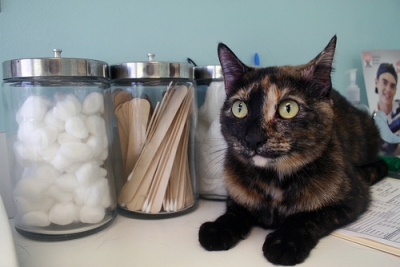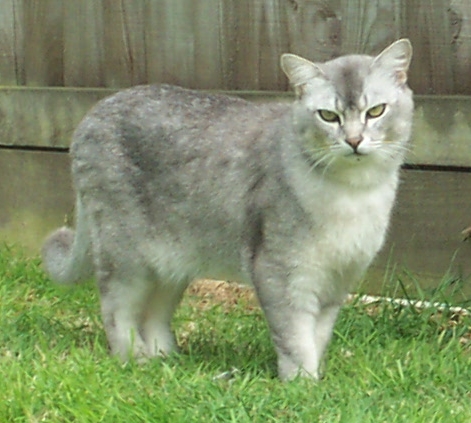
To guard the health of your cat be aware of any changes such as unusual behavior, not eating well, drinking more, using the litter box frequently. If you notice any change in your cat, it’s probably time for a trip to the vet. In order to maintain the health of your cat, take him/her for regular check-ups. Please do not give your cat any medication without the advice of your vet.
Upper Respiratory Infection (URI) – Symptoms can be sneezing, runny nose and/or eyes, fever, decreased appetite.
Lower Urinary Tract Disease (LUTD) – Symptoms include increased urinary frequency or inability to urinate, blood in urine, dehydration, decrease in appetite, vomiting.
Other Medical Conditions that Cause Cats to Urinate in Home
Feline Diabetes – Diabetes is an endocrine disorder, an inability to process sugar and produce enough insulin. Symptoms are increased appetite, weight loss, increased water consumption.
Skin Diseases
Alopecia – A skin disease that can appear due to illness, infection or endocrine problems. Symptoms are hair loss, bald patches, skin inflammation or redness.
Cheyletiellosis – is highly contagious and is caused by skin mites. Symtoms are constant itching leading to flaking and scaling of the skin.
Cancer – Signs of Feline Cancer can be a lump that grows larger, changes in elimination, unexplained bleeding, a sore that doesn’t heal, breathing difficulties, lamesness, appetite and weight loss, difficulty swallowing. Cancer is now the Number One killer of cats and while once seen in older cats, its is affecting younger cats as well. Cats suffer from the same types of cancer that afflict humans. Treatment of cancer in cats has made positive strides and is possible in many cases.
Heart Disease
Feline Hypertrophic Cardiomyopathy (FHC) is believed to be genetic. It is the thickening of the heart muscle. Symptoms are difficulty breathing, fainting, anorexia, lethargy and/or weakness, often heart failure and death without warning. Ongoing research hopes to identify the mutation and that ccats can be treated with gene therapy.
Feline Hypertension or high blood pressure occurs when the cat has kidney disease, heart problems or hyperthyroidism. The frequency of Feline Hypertension has increased along with the lifespan of cats. You vet will monitor your cat for high blood pressure along with treating any disease.
Heartworm – While thought of as attacking dogs, these disease-carrying mosquitoes have become a threat to cats as well. Cats often show no symptoms or those similar to asthma – difficulty breathing, coughing, sometimes vomiting. Heartworm is preventable with drugs for cats given monthly year-round.
Allergies (Asthma)- Asthma and allergy symptoms are similar – difficulty breathing and deep, moist coughing. Asthma and other allergies are related so try to allergy-proof your house as you would for a human sufferer.
Cystitis – Symptoms are blood in the urine, frequency or difficulty urinating, or even formation of particles similar to kidney stones and very painful.
Liver Disease is difficult to detect without a blood test. The liver can be affected by other illnesses. However if your cat appears to be jaundiced, showing yellowish eyes, under the tongue and skin, it’s probably a liver problem.
Tooth and Gum Disease can be caused by a buildup of plaque and tarter. Brushing your cat’s teeth will help avoid problems. But have your vet check your cat’s teeth and gums regularly.
Arthritis is a degenerative joint disease that can affect cats as well as humans, It is generally seen in older cats. Symptoms can include stiffness when rising, lameness, behavior changes such as depression or aggression. There are medications today that can relieve pain and give your cat a quality life. I use Glucosamine/Chondroitin for my dogs and it has given them very effective relief. It is available in a dosage for cats. Before giving your cat any medication, seek the advice of your vet.
Toxoplasmosis – Toxoplasmosia is a parasite that can affect humans neurologically. It is passed to humans in the stool of infected cats. Take care when cleaning your cat’s litter box and wash your hands thoroughly.
Epilepsy – Epilepsy is a disease that causes convulsions.
Meningitis – Meningitis occurs when the tissue surrounding the brain and spinal cord becomes inflamed. Symptoms include fever, stiffness, painful spasms, sensitivity to touch.
Seizures – Seizures occur due to brain trauma like accidents, viral or bacterial infections, poisoning, epilepsy.
Strokes – Strokes in pets usually occur when normal blood supply to the brain is reduced. Symptoms can be head tilting, difficulty walking, loss of vision and bowel control, sudden behavioral changes.
Narcolepsy – Narcolepsy in pets is a rare, genetic condition. The cat suddenly falls asleep during an activity or develops weakness, neck muscles shake and the head falls down. The cat seems to recover spontaneously.


